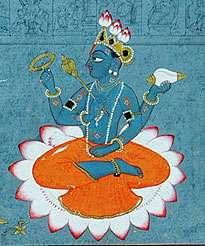Hari
| Part of a series on |
| Vaishnavism |
|---|
 |
|
Important deities |
|
Sampradayas |
|
|
Hari or Har(i) (Sanskrit: हरि, Punjabi: ਹਰਿ, IAST: Harī or Har) is a name for the supreme absolute in the Vedas, Guru Granth Sahib and many other sacred texts of south asia. In Rigveda’s Purusha Suktam (Praise of the supreme cosmic being), Hari is the first and most important name of god (Brahman), alternative name of supreme being is Narayana after Hari and Purusha according to Narayana Suktam of yajurveda. In the Hindu tradition, it is often used interchangeably with Vishnu to such an extent that they are considered to be one and the same. In Vedas, it is required to use the mantra "Harih om" before any recitation, just to declare that every ritual we perform is an offer to that supreme divine even if the hymn praises any demigod. In Hinduism, kirtan or praise songs of any god has a common name known as Hari kirtan and katha or storytelling is known as Hari katha.
No depiction of Hari (God) is permitted in Sikhism. Hari in Purusha Suktam, Narayana Suktam and Rudra Suktam is usually depicted as having a form with countless heads, limbs and arms (a way of saying that Supreme divine is pervaded everywhere and cannot be limited). Lord Hari is also called sharangapani as he also wields a bow named as sharanga.
The word "Hari" is widely used in Sanskrit and Prakrit literature, Hindu, Buddhist and Jain religions. The name "Hari" also appears as the 656th name of Vishnu in the Vishnu sahasranama of the Mahabharata and is considered to be of great significance in Vaishnavism.
Etymology
The Sanskrit word "हरि" (Hari) is derived from the Proto-Indo-European root "*ǵʰel- to shine; to flourish; green; yellow" which also gave rise to the Persian terms zar 'gold', Greek khloros 'green', Slavic zelen 'green' and zolto 'gold', as well as the English words yellow and gold.
The same root occurs in other Sanskrit words like haridrā, 'turmeric', named for its yellow color.
Other Names of Hari
There are multiple names of Lord Hari mentioned in the holy scriptures of Hinduism such as the Bhagwad Gita and Mahabharata. A few names which are used quite frequently,
In Indian religion and mythology

- The Harivamsha ("lineage of Hari") is a text in both the Puranic and Itihasa traditions.
- As the name of tawny-colored animals, hari may refer to lions (also a name of the zodiacal sign Leo), bay horses, or monkeys. The feminine Harī is the name of the mythological "mother of monkeys" in the Sanskrit epics.
- Harihara is the name of a fused deity form of both Vishnu (Hari) and Shiva (Hara) in Hinduism.
- Hari is the name of a class of gods under the fourth Manu (manu tāmasa, "Dark Manu") in the Puranas.
- In Hinduism, beginning with Adi Sankara's commentary on the Vishnu sahasranama, hari became etymologized as derived from the verbal root hṛ "to grab, seize, steal", in the context of Vaishnavism interpreted as "to take away or remove evil or sin",[1] and the name of Vishnu rendered as "he who destroys samsara", which is the entanglement in the cycle of birth and death, along with ignorance, its cause;[2] compare hara as a name of Shiva, translated as "seizer" or "destroyer".
- In the Gaudiya Vaishnava tradition, Hari is a name of both Krishna or Vishnu, invoked in the Hare Krishna mantra (Hare is a vocative form of Harih, used in mahamantra).
- The element hari is found in a number of Hindu given names, e.g. Bhartrhari, Harendra (i.e. hari-Indra), Harisha (i.e. hari-Isha), Hariprasad, Harikesh (Harikesha, "golden-haired", also a name of Shiva and of Savitar), etc.